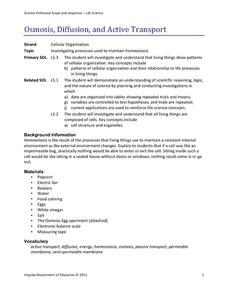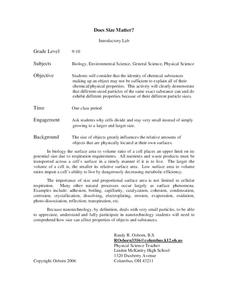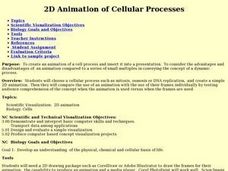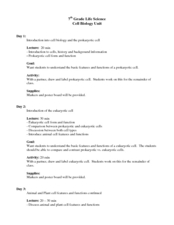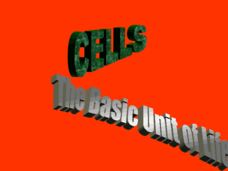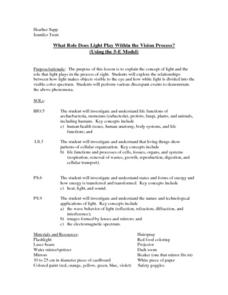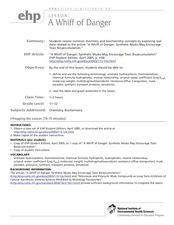Virginia Department of Education
Osmosis, Diffusion, and Active Transport
No, it really is okay to play with your food! Emerging scientists manipulate popcorn, eggs, and other household objects as they demonstrate multiple cellular processes. The activity, capable of modifications, is designed to reflect...
Curated OER
Electron Transport System Made Fun and Easy:
Students identity the components of electron transport system through role play. They explain the role of intermediate energy carriers to the production of ATP molecules. They describe the relationship of electron transport system to...
Curated OER
Study Guide for Chapter 9: Cellular Respiration
For this cellular respiration worksheet, students review the processes of cellular respiration. Students explain, illustrate, label and chart glycolysis, Krebs cycle and Electron transport chain.
Curated OER
Investigating Factors That Affect Cell Membrane Permeability
Cell membranes and the factors that affect its integrity are studied, with Beet tissue used as the model. A poster to display findings of the permeability of the membranes would clarify understanding and also allow a layer of language...
Curated OER
Cell 5 Diffusion and Osmosis
Students distinguish between active and passive transport. Students identify key words associated with active and passive transport. They draw and explain the structure f the cellular membrane. They are able to define phospholipid...
Curated OER
Does Size Matter?
Students explore the surface area to volume ratio in cellular respiration. While participating in an interactive lab experiment, they examine proportional surface area and discuss nanotechnology. Students observe the effectiveness of...
Curated OER
2D Animation of Cellular Processes
Students create an animation of a cell process and insert it into a presentation. They choose a cellular process such as mitosis, osmosis or DNA replication, and create a simple 2D animation.
Curated OER
Cell (Biology)
Young scholars conduct a series of activities to explore the nature of cells. For this biology lesson, students observe plant and animal cells under the microscope and compare them. They differentiate osmosis and diffusion.
Curated OER
Cells - The Basic Unit of Life
Introduce students to cells, and their many parts in this biology presentation. Students see that plant and animal cells have many of the same type of structures, but also have many differences as well. They will be challenged to state...
Virginia Department of Education
Structure and Function of Cell Membranes
Lead your high school class on an exploration inside the cell. Individuals investigate the relationships between cells structure and function given their relative locations on the cell membrane. They explore the concept of homeostasis...
Curated OER
Respiration
In this science worksheet, students answer 14 questions about respiration. For example, "Cellular Respiration starts off with..."
Curated OER
Respiration
Students explore Adenosine Triphosphate and how energy is released. They examine the basic process of cellular respiration and draw its chemical formula. After describing cellular respiration and photosynthesis, students compare and...
Curated OER
Cell physiology and chemistry
Young scholars design an experiment to discriminate between chemical diffusion, osmosis, facilitated diffusion and active transport through a membrane. Be specific about predictions and interpretations!
Curated OER
Cells Study Questions and Definition
In this cells worksheet, students define 14 words associated with cells. They answer 12 short answer questions about the structure and function of the cellular system.
Curated OER
Classification 2
Students discuss what makes a living thing (for example, cellular respiration) and collect a selection of living things from outside. They divide their organisms into plants and animals and create a key for the divisions.
Curated OER
What Role Does Light Play Within the Vision Process?
Pupils are introduced to the relationship between light and vision. In groups, they participate in experiments to discover how different wavelengths are divided in the visible spectrum. They record their answers and discuss their...
Forest Foundation
The Nature of Trees
Young botanists examine the different parts of tress and then draw parallels between the functions of these parts and the function of parts of the human body.
Lake Science Collaborative
Blood Circulation Simulation
Act out the circulation of blood in the body with an innovative activity. Kids act as either body parts or blood, and carry necessary nutrients and waste throughout different stations to represent the way that oxygen circulates.
Curated OER
Energy, Matter, and Organization
Tenth graders review the Energy, Matter, and Organization unit. They have one week to complete an essay. Students must submit a concept map or drawing. The activity is introduces by reading a short story line which presents a simple...
Virginia Department of Education
The Ratio of Surface Area to Volume
Demonstrate the ratio of surface area to volume in your high school class by using phenolphthalein, gelatin, and an onion. Intrigue the class by leading a discussion on osmosis and diffusion, then making "scientific jello." Participants...
Curated OER
Time Lapse Seed Germination with the QX3 Intel Digital Microscope
Students use the time-lapse feature of the QX3 Intel Digital Microscope
to observe germination of seeds. They use the QX3 Intel Digital microscope to create time lapse video films of seed germination experiments.
Curated OER
A Whiff of Danger
Public health trainees read and write a summary of the article, "A Whiff of Danger". The article is not available through the link, but can be found on the National Center for Biotechnology Information website. After summarizing,...
National Center for Case Study Teaching in Science
Bad Fish, Bad Bird
In an advanced biology lesson, learners see a PowerPoint about biologist Dr. Westwood, a two-time victim of poisoning. Designed to be used with clickers in the classroom, you could modify the lesson by creating a worksheet from the...
Curated OER
Applied Science - Technology (3A) Pre Lab
Third graders discuss electric currents. In this circuit lesson, 3rd graders create a picture of a battery circuit and a light bulb. They show the positive and negative charge and the flow of electrons.
Other popular searches
- Cellular Transport Methods
- Cellular Transport Web
- Cellular Transport Game
- Types of Cellular Transport
